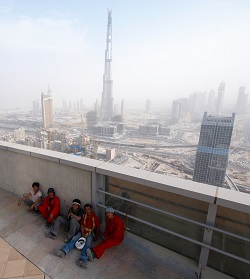Last week the State Department released its annual Trafficking in Persons report, with Secretary of State John Kerry making a bold, unequivocal statement on the seriousness of the issue at the launch this morning: “All of us in this room are really all too aware that there’s perhaps no greater threat to human dignity and no greater assault on basic freedom than the evil of human trafficking… this is a form – not a form – it is slavery.”
The report lists the Gulf as one of the worst regions in the world for human trafficking and migrants’ rights. Not a single Gulf Cooperation Council (GCC) country was designated above Tier 2, which means that these countries are failing to comply with the international standards of the Trafficking Victim’s Protection Act. Two GCC countries, Saudi Arabia and Kuwait, received the worst ranking and were placed in Tier 3 due not only to their lack of compliance with the minimum international standards, but because they have also failed to demonstrate that they are making any efforts comply. Bahrain and Qatar were put on the Tier 2 Watch List, signifying that “the absolute number of victims of severe forms of trafficking is very significant or is significantly increasing” and “a failure to provide evidence of increasing efforts to combat severe forms of trafficking”. The State Department’s report comes to the same conclusions about the poor state of migrants’ rights in the GCC as ADHRB’s recent report on the issue.
Two of the 12 examples in the report used to demonstrate the harrowing ordeals that trafficked persons face were from Gulf countries. A case in the United Arab Emirates (UAE) — one of the countries ranking among the relative best in the region — was indicative of many of the methods used to traffic persons in the Gulf. In the case study, women from Pakistan were tricked into coming to the UAE after being assured they would work in a salon. Upon arriving, their passports were confiscated and they were forced into prostitution. The report later highlights the case of a Filipina immigrant who came to Saudi Arabia under similarly false pretenses and was sold to new employers eleven different times, facing physical abuse from each one. These practices are common throughout the GCC, and as Human Rights Watch’s Nicholas McGeehan said at a recent ADHRB-sponsored event in Geneva, talk of reform look good on paper but falls far short in practice. This has been the case with Tier 2 Watch List countries Bahrain and Qatar, who have made several new pledges for reform. If the past is any indication, it is unlikely that these reforms will be enforced.
Americans for Democracy and Human Rights in Bahrain commends the State Department’s extensive efforts to document human trafficking in the Gulf and across the world. ADHRB further hopes that the State Department will keep a close watch on the process of reforms promised by Qatar and Bahrain, and to fairly assess their progress on these critical reforms moving forward.
—
Matthew Starkston is an Advocacy Intern at ADHRB





